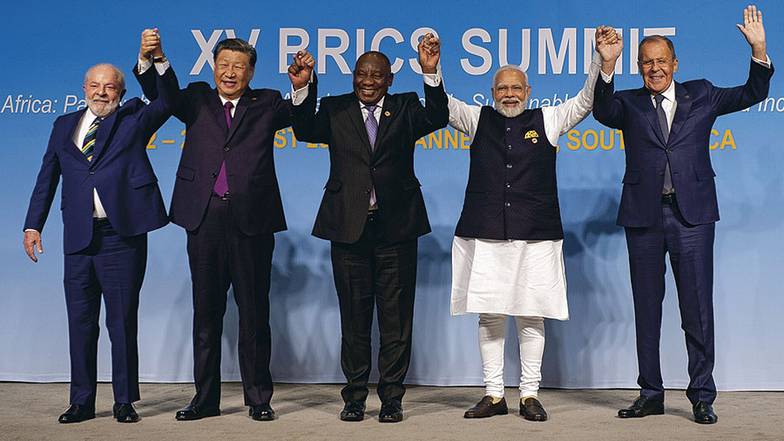
Has the US dollar already hit the BRICS iceberg?
By Phil Butler
As of the time of me writing this , US dollar reserves have fallen by 6.5% as foreign central banks cut ties with the currency. The BRICS countries, especially those in the global South, are leading the charge to depart from the decades-long dominance of the American currency. China and Japan’s central bank shares show the most significant rise in central banks. Interestingly, the Euro is just slightly behind in losing a share in the world currency market.
If BRICS stops using the USD, there will likely be a financial disaster in the United States, with hyperinflation wreaking havoc across all sectors in the US. However, losing the dollar as the medium of exchange worldwide is not the most significant danger for the American hegemony. Collaboration and stronger ties between the BRICS and emerging nations are essential. Xn Iraki, an associate professor in the Faculty of Business and Management Sciences of the University of Nairobi, offered this via China Daily:
“BRICS is at a watershed in terms of global economic organisations, with less-developed countries now having access to technology from more advanced ones and having an opportunity to diversify their exports and gain access to new sources of funding.”
The professor suggested member countries strengthen intergroup collaboration in many fields, including cultural exchanges, science and technology. Once this level of partnership begins, the so-called Global South will be much more influential on the financial and geopolitical scales. What the experts are suggesting is not just a business shift, but a literal change of identity for poorer nations that wielded almost no power or influence. This is the great appeal for joining the BRICS; the US and its allies have no comparable leverage point.
The BRICS account for 37% of the world’s GDP, while the G7 only squeaked out 30%. With the UAE, Saudi Arabia, and Iran joining the group, oil production on Earth will be firmly in the hands of BRICS members. US government data shows BRICS’ share of global oil production blossoming from 19% to 41% after the recent expansion.
The US dollar, which is increasingly weaponised through economic sanctions on Russia, Venezuela, Iran, and many other countries, will take the biggest hit if a BRICS countercurrency situation arises. In America, increasingly burdensome debt and deficit spending on wars and programs that do not directly benefit the nation’s people will cause major internal problems. To better understand the potential effects of a replacement or competitive exchange currency, I called Forbes’ “BRICS Breaker” and respected industry analyst Kenneth Rapoza. Here’s part of an extended explanation he gave me of the effects of such an economic shift:
“The immediate, most dramatic effect will be the sell-off of Treasury bonds in the market. I don’t know how long that sell-off would last, but you would see bond prices fall as investors sell, and when bond prices fall, interest rates go up. High-interest rates are not good for U.S. businesses and consumers.”
Factor in the 40 or more countries interested in joining the BRICS and the 16 that have already applied for membership, and the situation for the hegemony gets darker. Former IMF executive director and former vice president of the New Development Bank, Brazilian economist Paulo Nogueira Batista Jr., was quoted by Modern Diplomacy saying, “The possibility of a common BRICS currency being presented at the next year’s summit in Russia is a distinct possibility.” Once this happens, all that stands in the way of the nations of BRICS overcoming the current dollar supremacy is “developing a multilateral system of settlements so that financial flows can be directed to priority industries in the developing countries.” (Aleksei Kuznetsov)
A last note: Ken Rapoza also addressed the geopolitical side of a replacement currency. He suspects that the “US government would do everything it could, including using the Intelligence Community to disrupt any government, vilify any government, or even sanction any government for any reason, including reasons they will invent if they felt the dollar was going to go to say… 70% of world transactions.” So, for most of you reading this, I know the question in your mind is, “Isn’t this what the U.S. and allies are already doing to many nations?”
The United States has been sailing full steam ahead on an unsustainable course for decades. It seems to me the world is not only tired of our warmongering hegemony but of the one-sided system of supercapitalism. America has taken the lion’s share of every resource on the planet over the past 70 years and has suppressed hundreds of millions of people in doing so. Their loss was America’s gain, in the same way European imperialists pirated most of the world’s wealth before WWII. A paradigm shift now only seems past due. I think our Titanic mistake has already led us to strike an immovable iceberg.
This article originally appeared at the New Eastern Outlook https://journal-neo.su/
